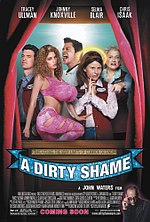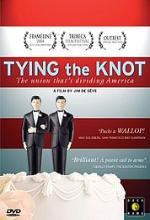

Knight at the Movies ARCHIVES

The Outsiders (Catholic Gay Men and Sex-a-holics):
Tying the Knot, A Dirty Shame
9-29-04 Knight at the Movies column
By Richard Knight, Jr.
2004, the year of activist filmmaking, continues with Tying The Knot, the first full-length documentary from
out director Jim de Sève. Like the rest of this year’s crop of hot button issue films (Outfoxed, The Corporation,
etc.) and most notably, Michael Moore’s Fahrenheit 9/11 which collected the current White House administration’s
attempts to spin post 9/11 events into a case for war with Iraq, de Sève’s film puts a face to yet another topic in
our ongoing culture war: gay marriage.
Also like Fahrenheit, it’s galvanizing, after hearing so much for the past decade about the issue, to see a timeline
that clearly disseminates everything at once. The film begins with astonishing black and white video footage of the
Gay Activists Alliance’s temporary takeover in 1971 of the Manhattan Marriage Bureau. As the group chants, “gay
power” and sings, “We’ve waited too damn long for our rights,” co-founder of the group Arthur Evans happily
answers the Bureau’s phone. Evans, a double for John Lennon or Jesus Christ, complete with hippie beads and a
headband, forever found a place in my activist heart when he asks the caller, “Your mother and dad want to get
married? Are they gay? Oh, I’m sorry, we can’t help you” and slams down the phone.
After this brief, tantalizing snippet and a smooch fest of blissed out, just married (make that just civil unioned)
shiny happy gay and lesbian couples of all sizes and colors over the credits, the film moves to a little history lesson
on the 2,500 year social institution of marriage itself from acrid and funny journalist and historian E.J. Graff. From
there, the director begins to weave in the film’s two main stories. We meet Mickie and Lois, two lesbian cops from
Tampa, Florida; see them in home video footage, dressing in their matching tuxes, and being feted by family and
friends as they take vows of commitment in 1991. Then, it’s on to Sam, a farmer from rural Oklahoma, who was
with his life partner Earl for 22 years and is involved in a battle over his estate. Based on the gritty footage here,
it’s easy to see that de Sève could have ratcheted up these stories in the direction of one of those HBO Undercover
Specials like “Pimps Up, ‘Ho’s Down” (or portions of Fahrenheit, for that matter) but he adds weight to the film by
resisting the urge to do so.
The indignities confronting the participants in these stories is moving and frustrating but it might have helped from
an audience viewpoint to at least see the filmmaker trying to contact the antagonists for their side of the story.
The film does give plenty of face time to those in opposition to gay marriage, though, as the middle-aged Mickie-
Lois, Sam-Earl stories are interspersed with the chronological progression of the issue’s commodification by
conservative leaders, members of congress and Mr. Bush, which does indeed rub salt in the wounds. The movie
also reminds us that Bill Clinton was no friend to gay marriage, signing into law the Defense of Marriage Act. The
doom and gloom is finally relieved by Tor and Louis, who were among the first to be legally wed in Amsterdam in
2001 – this after 36 years as a couple – and continues with uplifting footage of the recent headline events in
Massachusetts and San Francisco on the issue.
In the end, while Tying The Knot is heartbreaking, frustrating, inspirational, and finally hopeful, it lacks the on-
camera inclusion of a young gay or lesbian couple that could have revved up another segment of Our People. I’d
like to have seen the story of a pair who traveled out to San Francisco, say, only to see the door slammed in their
faces and singing a chorus of “Wedding Bell Blues” on the courthouse steps or maybe a circuit party duo trying to
get a license in Massachusetts – maybe one of the couples that we glimpsed tantalizingly in the opening credits.
But de Sève has still given us plenty of food for thought, including this comment from Tor: “In Holland we have a
saying, ‘You can judge how great a country is by how well it treats it’s minorities.’” Based on the evidence here,
such a saying doesn’t exist in the U.S.
+++++++++++++++++++++++++++++++++++++++++++++++++++++++++++++++
WARNING: The following review is rated NC:17 for extreme sexual content! Sexually chaste individuals should
stop reading right now. Okay, you’ve been warned – now you’re in for a pecker, in for a pussy. With A Dirty
Shame John Waters finally shoots his wad. What else to say about this last gasp of shocking bad taste intended
to shock jaded filmgoers except that Waters scores – agin ‘n agin ‘n agin. This is his funniest film in years and
after the missteps of Cecil B. Demented and to a lesser degree Pecker, Waters is back at last in the trailer park
trashy side of town where his best films reside. From the moment housewife Sylvia Stickles (Tracy Ullman) gets
bonked on the head and wants to go sexin’ with sex guru and tongue devil Ray Ray (Johnny Knoxville), the movie
is one laugh orgasm after another. Every terrific Waters cliché is here (and the nonstop soundtrack is another
hilarious musical wet dream) along with his remaining “Players” (and Knoxville is inspired casting). After the
mainstream success of “Hairspray” on Broadway, it’s hilariously perverse to see Waters go backwards full tilt into
Off Limits territory. One quibble: the movie’s end is too abrupt and feels, yes, like the visual equivalent of a
premature ejaculation. Not unlike the Andrea True Connection, I wanted “More More More.”
Tying the Knot, A Dirty Shame
9-29-04 Knight at the Movies column
By Richard Knight, Jr.
2004, the year of activist filmmaking, continues with Tying The Knot, the first full-length documentary from
out director Jim de Sève. Like the rest of this year’s crop of hot button issue films (Outfoxed, The Corporation,
etc.) and most notably, Michael Moore’s Fahrenheit 9/11 which collected the current White House administration’s
attempts to spin post 9/11 events into a case for war with Iraq, de Sève’s film puts a face to yet another topic in
our ongoing culture war: gay marriage.
Also like Fahrenheit, it’s galvanizing, after hearing so much for the past decade about the issue, to see a timeline
that clearly disseminates everything at once. The film begins with astonishing black and white video footage of the
Gay Activists Alliance’s temporary takeover in 1971 of the Manhattan Marriage Bureau. As the group chants, “gay
power” and sings, “We’ve waited too damn long for our rights,” co-founder of the group Arthur Evans happily
answers the Bureau’s phone. Evans, a double for John Lennon or Jesus Christ, complete with hippie beads and a
headband, forever found a place in my activist heart when he asks the caller, “Your mother and dad want to get
married? Are they gay? Oh, I’m sorry, we can’t help you” and slams down the phone.
After this brief, tantalizing snippet and a smooch fest of blissed out, just married (make that just civil unioned)
shiny happy gay and lesbian couples of all sizes and colors over the credits, the film moves to a little history lesson
on the 2,500 year social institution of marriage itself from acrid and funny journalist and historian E.J. Graff. From
there, the director begins to weave in the film’s two main stories. We meet Mickie and Lois, two lesbian cops from
Tampa, Florida; see them in home video footage, dressing in their matching tuxes, and being feted by family and
friends as they take vows of commitment in 1991. Then, it’s on to Sam, a farmer from rural Oklahoma, who was
with his life partner Earl for 22 years and is involved in a battle over his estate. Based on the gritty footage here,
it’s easy to see that de Sève could have ratcheted up these stories in the direction of one of those HBO Undercover
Specials like “Pimps Up, ‘Ho’s Down” (or portions of Fahrenheit, for that matter) but he adds weight to the film by
resisting the urge to do so.
The indignities confronting the participants in these stories is moving and frustrating but it might have helped from
an audience viewpoint to at least see the filmmaker trying to contact the antagonists for their side of the story.
The film does give plenty of face time to those in opposition to gay marriage, though, as the middle-aged Mickie-
Lois, Sam-Earl stories are interspersed with the chronological progression of the issue’s commodification by
conservative leaders, members of congress and Mr. Bush, which does indeed rub salt in the wounds. The movie
also reminds us that Bill Clinton was no friend to gay marriage, signing into law the Defense of Marriage Act. The
doom and gloom is finally relieved by Tor and Louis, who were among the first to be legally wed in Amsterdam in
2001 – this after 36 years as a couple – and continues with uplifting footage of the recent headline events in
Massachusetts and San Francisco on the issue.
In the end, while Tying The Knot is heartbreaking, frustrating, inspirational, and finally hopeful, it lacks the on-
camera inclusion of a young gay or lesbian couple that could have revved up another segment of Our People. I’d
like to have seen the story of a pair who traveled out to San Francisco, say, only to see the door slammed in their
faces and singing a chorus of “Wedding Bell Blues” on the courthouse steps or maybe a circuit party duo trying to
get a license in Massachusetts – maybe one of the couples that we glimpsed tantalizingly in the opening credits.
But de Sève has still given us plenty of food for thought, including this comment from Tor: “In Holland we have a
saying, ‘You can judge how great a country is by how well it treats it’s minorities.’” Based on the evidence here,
such a saying doesn’t exist in the U.S.
+++++++++++++++++++++++++++++++++++++++++++++++++++++++++++++++
WARNING: The following review is rated NC:17 for extreme sexual content! Sexually chaste individuals should
stop reading right now. Okay, you’ve been warned – now you’re in for a pecker, in for a pussy. With A Dirty
Shame John Waters finally shoots his wad. What else to say about this last gasp of shocking bad taste intended
to shock jaded filmgoers except that Waters scores – agin ‘n agin ‘n agin. This is his funniest film in years and
after the missteps of Cecil B. Demented and to a lesser degree Pecker, Waters is back at last in the trailer park
trashy side of town where his best films reside. From the moment housewife Sylvia Stickles (Tracy Ullman) gets
bonked on the head and wants to go sexin’ with sex guru and tongue devil Ray Ray (Johnny Knoxville), the movie
is one laugh orgasm after another. Every terrific Waters cliché is here (and the nonstop soundtrack is another
hilarious musical wet dream) along with his remaining “Players” (and Knoxville is inspired casting). After the
mainstream success of “Hairspray” on Broadway, it’s hilariously perverse to see Waters go backwards full tilt into
Off Limits territory. One quibble: the movie’s end is too abrupt and feels, yes, like the visual equivalent of a
premature ejaculation. Not unlike the Andrea True Connection, I wanted “More More More.”
Outsiders trying to win acceptance and John Waters returns to outsider territory

